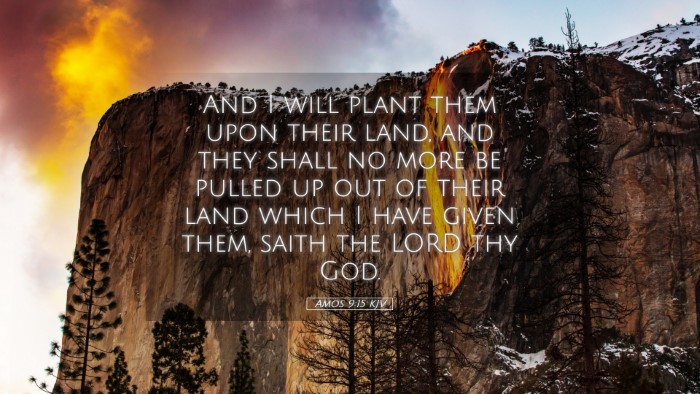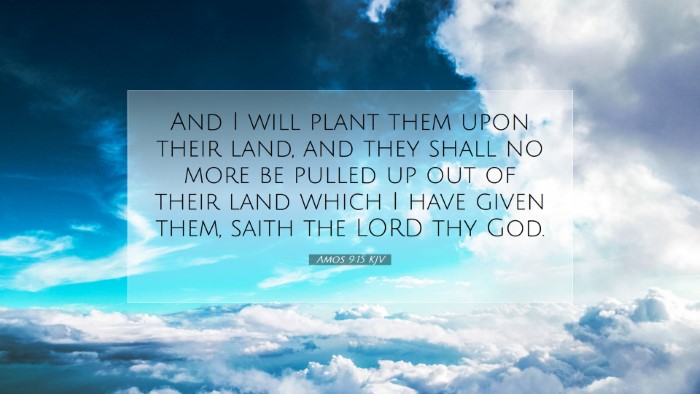Old Testament
Genesis Exodus Leviticus Numbers Deuteronomy Joshua Judges Ruth 1 Samuel 2 Samuel 1 Kings 2 Kings 1 Chronicles 2 Chronicles Ezra Nehemiah Esther Job Psalms Proverbs Ecclesiastes Song of Solomon Isaiah Jeremiah Lamentations Ezekiel Daniel Hosea Joel Amos Obadiah Jonah Micah Nahum Habakkuk Zephaniah Haggai Zechariah MalachiAmos 9:15
Amos 9:15 KJV
And I will plant them upon their land, and they shall no more be pulled up out of their land which I have given them, saith the LORD thy God.
Amos 9:15 Bible Commentary
Commentary on Amos 9:15
Verse Context: The book of Amos is a collection of prophecies addressing the northern kingdom of Israel during a time of prosperity but also moral decay. This final chapter closes with a message of hope for restoration amid the imminent judgment. Amos 9:15 reads: "And I will plant them upon their land, and they shall no more be pulled up out of their land which I have given them, saith the LORD thy God." This text embodies the themes of Divine promise and restoration after judgment.
General Insights
This verse encapsulates God's intent to re-establish His people in the Promised Land, signifying a covenantal assurance to the Israelites. The prophetic declaration reflects both a promise of physical restoration and a deeper spiritual renaissance post-exile.
Commentary Insights
Matthew Henry Commentary
Matthew Henry highlights the assurance of God's protection and provision for His people. He notes that the promise of being planted signifies a permanence and stability that was previously lost due to their sins. The imagery of “planting” suggests that God's people will thrive where He has placed them, indicating a new beginning. Furthermore, Henry emphasizes that the ultimate hope for Israel lies in their restoration through God's grace, where they will no longer face removal from their land, demonstrating God's faithfulness in keeping His covenant.
Albert Barnes' Notes on the Bible
Barnes elaborates on the themes of permanence and security in this verse. He explains that the phrase "shall no more be pulled up" suggests an end to the judgments that had resulted in the displacement of the Israelites. The emphasis on being "planted" further delineates God’s commitment to establishing His people firmly, illustrating an enduring relationship between them and the land. Barnes also draws attention to the spiritual implications, indicating that this restoration is not just a physical return but involves a spiritual revival where God's people would once again seek Him earnestly and live righteously under His blessing.
Adam Clarke's Commentary
In his commentary, Adam Clarke sheds light on God’s sovereign will in restoration. He notes that the promise of re-planting indicates a renewal of divine favor and an uplifting of the spirit of Israel. Clarke poignantly reflects on the former sins of the people and their resultant captivity, positing that this promise is amidst their repentance. He suggests that God's act of planting them once again symbolizes not only geographical relocation but a transformation of heart and an accession to a renewed covenantal relationship. He also indicates that the return to the land is a paradigm of forthcoming restoration where God's justice and mercy are both showcased.
Theological Implications
The verse transcends its historical circumstances to reveal significant theological truths. It showcases the wonder of God's grace, evidencing that despite human failing, His intentions toward His people remain rooted in love and fidelity. This can be seen as a precursor to the New Testament understanding of spiritual restoration through Christ. The metaphor of planting speaks of growth and fertility, pressing the Church today to consider their spiritual vitality under God's guidance.
Practical Applications
- Hope in Restoration: This passage serves as a powerful reminder for individuals and congregations experiencing trials or spiritual desolation. God’s promise of restoration should instill hope, encouraging believers to look towards future blessings that He has in store.
- A Call to Righteousness: Understanding that restoration follows repentance fosters a call for personal and communal righteousness. It challenges believers to align with God's will and seek after Him earnestly.
- Commitment to God’s Covenant: Reflecting on God’s unwavering commitment provides a model for covenant relationships within the Church. Christians are urged to reflect this faithfulness in their relationships with God and one another.
Conclusion
Amos 9:15 is rich in promises highlighting restoration and permanence. Through the insights from Matthew Henry, Albert Barnes, and Adam Clarke, the verse unveils a multifaceted understanding of God’s unwavering promise to His people. It foreshadows not only a return to the land but evokes a desire for spiritual renewal that is paramount for anyone seeking to serve in pastoral roles, study theology, or engage with Scripture deeply.


